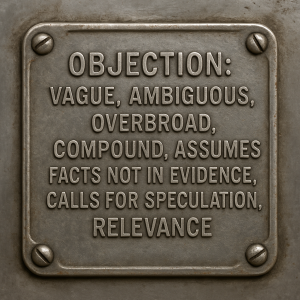Your Boilerplate Objections are Garbage, and They Make You Look Dumb.
A Guide to Fighting The Menace of Boilerplate Objections
by Personal Injury Lawyer Noah Schwinghamer.
Table of Contents
What are Boilerplate Objections?
“Boilerplate” objections are stock, generalized responses to discovery that are repeated verbatim across multiple requests without regard to the actual content of the question. The term comes from the metal boilerplates that were mass produced and which contained multiple lines of fine print about the manufacturer.
These objections often include sweeping assertions like “vague, ambiguous, overbroad, unduly burdensome, and not reasonably calculated to lead to the discovery of admissible evidence”—often strung together in a single sentence without explanation. Courts uniformly condemn this practice because discovery objections must be specific and factually supported, not rote incantations. (See Korea Data Systems Co. v. Superior Court (1997) 51 Cal.App.4th 1513.)
Boilerplate objections undermine the cooperative purpose of discovery. The Civil Discovery Act is designed to encourage transparency and the exchange of information necessary to prepare for trial. (Code Civ. Proc., § 2017.010.) Blanket objections, especially when used reflexively or without factual justification, obstruct that purpose and often signal bad faith.
How to Deal With Boilerplate Attorneys
Every litigator eventually encounters opposing counsel who reflexively serves pages of identical, non-responsive objections. The best approach is to stay professional, document everything, and build a clear record. Courts favor parties who demonstrate patience and good-faith efforts to resolve discovery disputes. (See Clement v. Alegre (2009) 177 Cal.App.4th 1277, 1294.)
Before filing a motion to compel, send a detailed meet-and-confer letter identifying each objection, explaining why it is improper, and inviting a substantive response. Use the language of the Code—specificity, factual basis, proportionality—to demonstrate your reasonableness. If the other side refuses to amend, your correspondence will become valuable evidence that the objections were asserted in bad faith. And remember, the goal is not to punish but to obtain the discovery you are entitled to. Judges appreciate professionalism backed by a well-developed record.
Why Are Boilerplate Objections So Bad?
Boilerplate objections waste judicial resources, inflate litigation costs, and erode the integrity of the discovery process. They force unnecessary meet-and-confer efforts and motions to compel, consuming time that should be spent resolving the merits of the case. California courts have repeatedly criticized “generalized, unsupported” objections as a misuse of the discovery process under Code Civ. Proc. § 2023.010(e).
Worse, they deprive the requesting party of the ability to evaluate the claimed grounds for withholding information. An objection must allow the other side—and the court—to assess its legitimacy. When counsel simply parrots phrases like “privileged” or “unduly burdensome” without explanation, it becomes impossible to test those assertions. That is why courts increasingly impose sanctions for boilerplate discovery responses—they are not merely sloppy; they are obstructive.
How to Fight Specific Boilerplate Objections
The most effective way to neutralize boilerplate objections is to attack them one by one, demonstrating why each fails under California law. Cite the relevant case law and statutory language to show the precise limits of each objection. For example, “vague and ambiguous” requires that the responding party truly cannot understand the question; “burdensome” requires evidence quantifying the claimed hardship. It is amazing how many well educated attorneys, with degrees from prestigious schools hanging on their walls, lose the ability to understand basic English words when interrogatories are served.
In motion practice, emphasize that the burden of proof rests with the objecting party, and that good cause is not required to serve interrogatories. (See Coy v. Superior Court (1962) 58 Cal.2d 210, 220-221) Unsupported objections are legally meaningless. Use the discovery statutes to your advantage—Code Civ. Proc. § 2030.240 mandates that any refusal to answer interrogatories be specific and justified. When opposing counsel cannot provide such justification, the court will typically overrule the objections and may impose sanctions for discovery abuse under CCP § 2023.010(e)-(f).
Federal Rules
Rule 33(b)(4) requires that objections to interrogatories be made “with specificity” and provides that “[a]ny ground not stated in a timely objection is waived unless the court, for good cause, excuses the failure.”
Rule 34(b)(2)(B) requires that objections to requests for production “state with specificity the grounds for objecting to the request.”
Rule 34(b)(2)(C) requires that “[a]n objection must state whether any responsive materials are being withheld on the basis of that objection.”
Getting Sanctions Against Attorney’s That Use Boilerplate Objections
The good news is that you can get sanctions against attorneys that persist in using boilerplate objections.
Under the Civil Discovery Act, discovery abuse is not only discouraged—it’s sanctionable. (Code Civ. Proc., § 2023.010(e)–(f).) Misuses of the discovery process include making unmeritorious objections and evasive responses that obstruct legitimate discovery efforts. When a party repeatedly asserts generic objections without factual or legal support, the court may impose monetary sanctions, and in egregious cases, issue or evidentiary sanctions. (Code Civ. Proc., § 2023.030.)
California courts have consistently upheld sanctions in this context. In Clement v. Alegre (2009) 177 Cal.App.4th 1277, the Court of Appeal affirmed monetary sanctions against counsel who repeatedly asserted boilerplate objections and refused to meaningfully engage in meet and confer efforts. The court emphasized that discovery must be conducted in good faith and that a party who obstructs that process by refusing to provide straightforward responses acts in bad faith and at their peril. (Id. at pp. 1294–1295.)
Boilerplate objections have been condemned by appellate courts as “nuisance objections” and, even when involving important privileges, have necessitated monetary sanctions to compensate for the time wasted in eliminating them. (See e.g., Standon v. Superior Court (1990) 225 Cal.App.3d 898 (re impropriety of boilerplate “nuisance” objections); Clement v. Alegre (2009) 177 Cal.App.4th 1277 (re imposition of sanctions for “meritless” and “nitpicking” objections); Williams v. Taser Int’l, Inc. (N.D.Ga 2007) 2007 U.S. Dist. LEXIS 40280 (“To the extent that Plaintiffs wish to compel Taser to omit boilerplate objections from its answers to interrogatories and requests to produce, Plaintiffs’ motion is granted. Even a cursory review of Taser’s discovery responses in this case reveals that its answers to Plaintiffs’ discovery requests are, almost without exception, qualified by boilerplate objections to the relevancy of the discovery sought, the undue burdens associated with its production, etc.”).)
In addition to being sanctionable, boilerplate objections can give rise to ethical violations and Jury Instructions for Willful Suppression of Evidence. Counsel must be careful not to assert objections to requests for production of documents that do not exist or are not in the attorney or party’s possession, custody or control. Such a response violates an attorney’s ethical duty under Bus & Prof Code §6068(d) to act truthfully and, therefore, constitutes bad faith. See Bihun v. AT&T Info. Sys. (1993) 13 Cal.App.4th 976, 991.
Practically speaking, the best way to obtain sanctions is to build a clear record of the opposing party’s misconduct. Attach the boilerplate responses as exhibits, document your meet-and-confer efforts, and cite the discovery statutes requiring specificity and factual support. When the pattern is clear, the court will often view sanctions not as punitive, but as necessary to restore fairness to the process.
Boilerplate objections are not just lazy—they are a direct violation of the duty of candor and cooperation that governs California discovery. And when attorneys persist in using them, sanctions are not only justified—they’re overdue.

